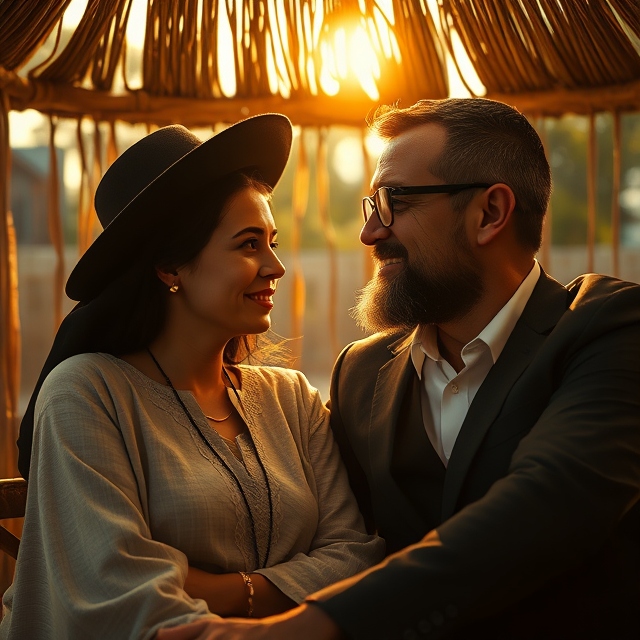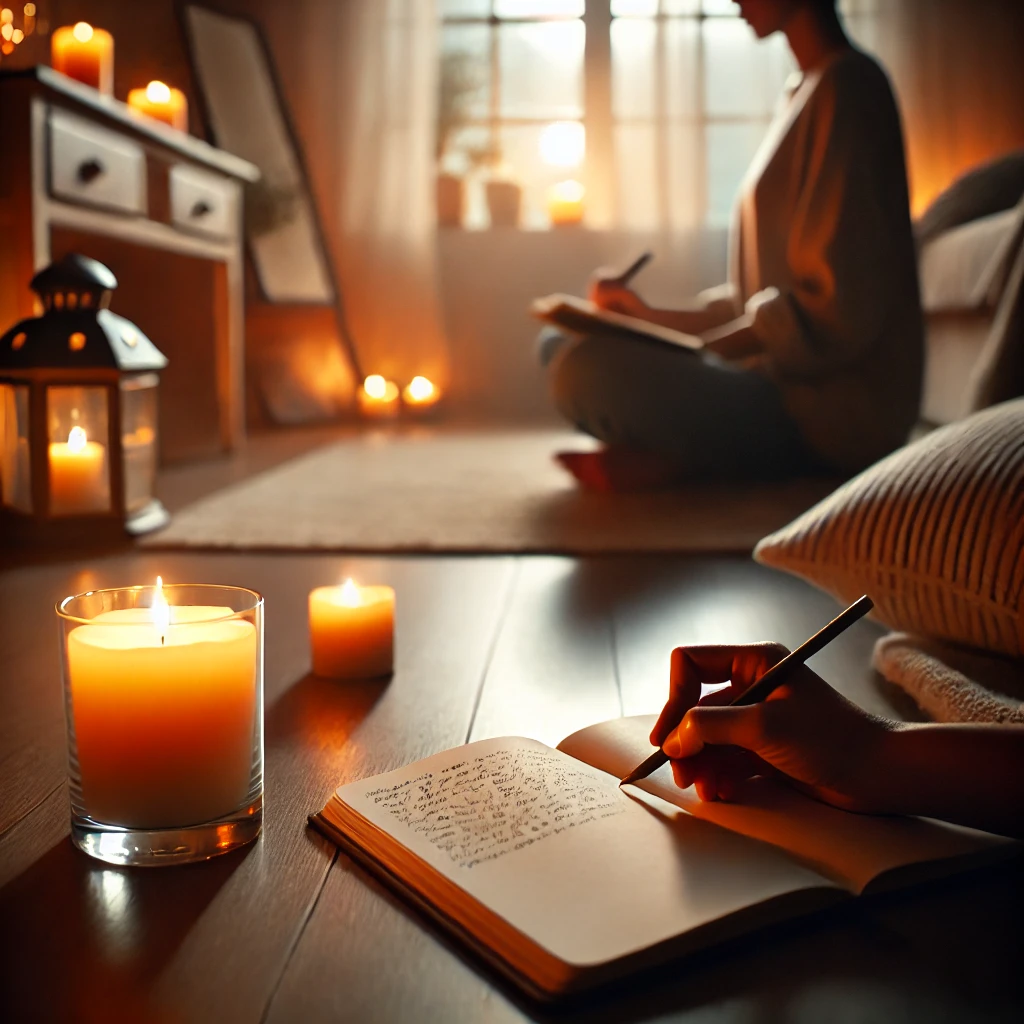A Sukkot Reflection about Relationships
Sukkot is a holiday where we step out of our comfortable homes and into the fragility of a sukkah, embracing the elements of nature—the wind, the cold, and sometimes even the rain. It’s a powerful metaphor for relationships, teaching us that true connection comes when we leave behind the walls we construct around ourselves and allow the uncomfortable exposure to create space for growth.
In a world where we often seek control and stability, Sukkot reminds us that there’s strength in surrendering to vulnerability. Much like sitting in a sukkah exposed to the outside world, being in a relationship means allowing someone to see your imperfections and share in your fears. It’s not always easy, but it’s through embracing this discomfort that we uncover deeper truths about ourselves and each other.
This Sukkot, try Sharing a Personal Story: Just as the sukkah opens itself up to the world, consider sharing something personal with your partner—a story about your past or a challenge you’ve faced. Vulnerability is an invitation to deeper understanding. For example, you might say, “I don’t usually talk about this, but I want you to know…” Opening up creates space for your partner to be open in return.
When we build our “sukkah” in a relationship, we have to be intentional about how we construct it. Are we setting up shaky walls of pretense, or are we building with the open honesty that will let light and warmth in? Relationships thrive when we take the risk to show our true selves—our joys, our insecurities, and even our uncertainties. It’s in that openness, just like in the sukkah, that we find genuine security, one that is built on trust rather than illusion.
This Sukkot, try Allowing Your Partner to Support You: We often try to handle everything on our own, but just as we trust the sukkah to shelter us, we need to trust our partners to support us. Next time you’re feeling overwhelmed, ask for help. Whether it’s emotional support or help with a task, showing that you can rely on them builds trust. For instance, if you’ve had a rough day, say, “I’m feeling really stressed. Could you help me figure this out?”
Sukkot also teaches us that we don’t need perfect conditions to experience joy. We might feel a breeze through the sukkah or hear a storm in the distance, but the celebration continues because we’ve learned to find beauty in the impermanent. Similarly, relationships aren’t always about perfection or avoiding conflict, but about learning to weather the storms together, knowing that each challenge brings you closer and strengthens your bond.
This Sukkot, try Celebrating the Small Wins: Just as we celebrate in the sukkah despite imperfect conditions, take time to celebrate small successes in your relationship. Did you navigate a tough conversation with grace? Did your partner support you in an unexpected way? Acknowledging these moments brings more joy into the relationship and shows that, like the sukkah, it’s the simple, authentic moments that matter.
So, as you reflect on your relationships this Sukkot, ask yourself: What walls have you built to protect yourself, and are they keeping you from deeper connection? Can you step out into the vulnerability and trust that, just like the sukkah, there’s strength in letting go and embracing the unknown?
Cheshbon HaRelationships
*Cheshbon hanefesh*—an accounting of the soul—is a key practice during Elul, a time dedicated to self-reflection and spiritual growth. We use this period to look back on our past actions, assess how we’ve lived over the past year, and set intentions for the year ahead. But this year, why not expand that sacred practice to include your past relationships—what I’m calling a “Cheshbon HaRelationships”? Elul gives us the perfect opportunity to reflect with intention on how our relationships, especially romantic ones, have shaped us. By engaging in this reflection, you can transform past experiences into powerful lessons that help guide you toward deeper self-awareness and healthier future connections.
It’s easy to fall into the trap of seeing past relationships that didn’t last as a waste—wasted time, money, and emotional energy. But Elul reminds us that we have the power to reframe those experiences. They’re only a waste if we let them be. Instead, I invite you to take some time this Elul to do some productive introspection. Light a candle, put on some music, and dedicate a quiet moment to reflect on your romantic past. To help guide you, I’ve broken this *cheshbon* into three main areas:
- What Did You Learn About Them?
Every person you’ve been in a relationship with has left an imprint on you. Even if the relationship didn’t last, there were moments of insight and lessons learned. Think back to each person—what strengths did they have that you admired? Maybe one was incredibly patient, and you found yourself drawn to their calm presence. Perhaps another was great at expressing their needs or had a passion that made you reflect on your own values.
By acknowledging their strengths, you not only honor what attracted you to them, but you also start to identify qualities you might want to develop in yourself or look for in a future partner.
Ask yourself:
– What’s one strength this person had that I don’t?
– How did their qualities shape my understanding of what I value in a partner?
– What did I admire most about them, and how can I integrate that into my life?
- What Did You Learn About Yourself?
Relationships act as mirrors, reflecting back who we are—sometimes in ways we don’t expect. Maybe you learned that you tend to shut down in conflict, or that you have a habit of not communicating your needs clearly. These insights can be uncomfortable, but they’re also essential for growth.
Elul invites us to look inward and ask hard questions about how we show up in our relationships. Did a past relationship bring out the best in you, or did it reveal behaviors you want to change? Recognizing these patterns helps you grow and prepares you for healthier, more fulfilling relationships in the future.
Ask yourself:
– What did this relationship teach me about myself?
– How did I handle conflict or communication in this relationship?
– What personal qualities or habits do I want to improve based on what I learned?
- What Did You Learn About Your Relationship Patterns?
Now, step back and look at the bigger picture. Do you notice any recurring themes in your relationships? Are you consistently drawn to a certain type of person, or do you find yourself facing the same challenges in each relationship? Recognizing these patterns is key to breaking free from cycles that no longer serve you.
Perhaps you’ve been attracted to emotionally unavailable partners, or maybe you tend to lose your voice in relationships, prioritizing their needs over your own. Elul gives you the chance to break these patterns and create new ones that are healthier and more aligned with what you want for your future.
Ask yourself:
– What relationship patterns do I notice across different partners?
– What dynamics keep repeating, and how can I address them?
– How can I break old patterns and cultivate healthier ones in my future relationships?
By taking ownership of your past experiences, you empower yourself to enter the new year with clarity, purpose, and the wisdom gained from your relationships. Instead of lamenting time lost, recognize the lessons you’ve learned, and move forward with hope for deeper love and connection.
May the insights you gain from this *Cheshbon HaRelationships* bring you closer to the meaningful, fulfilling relationships you seek in the year ahead.

